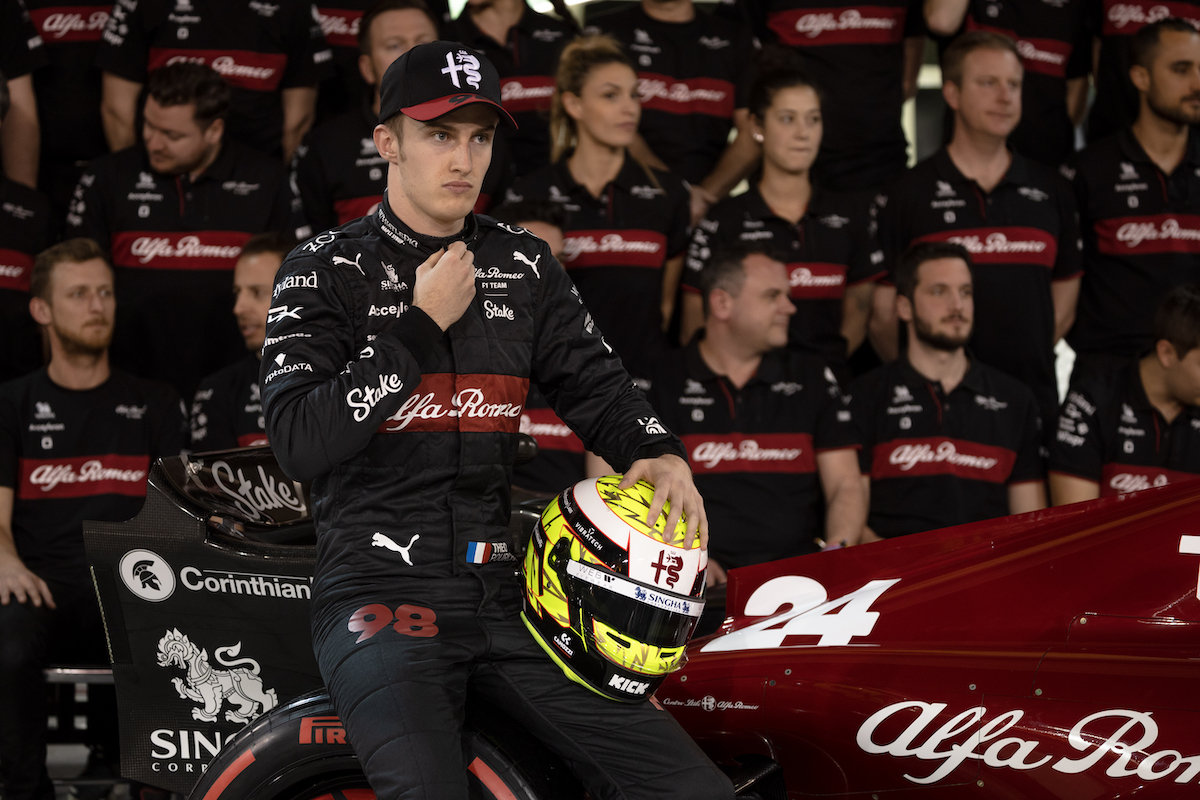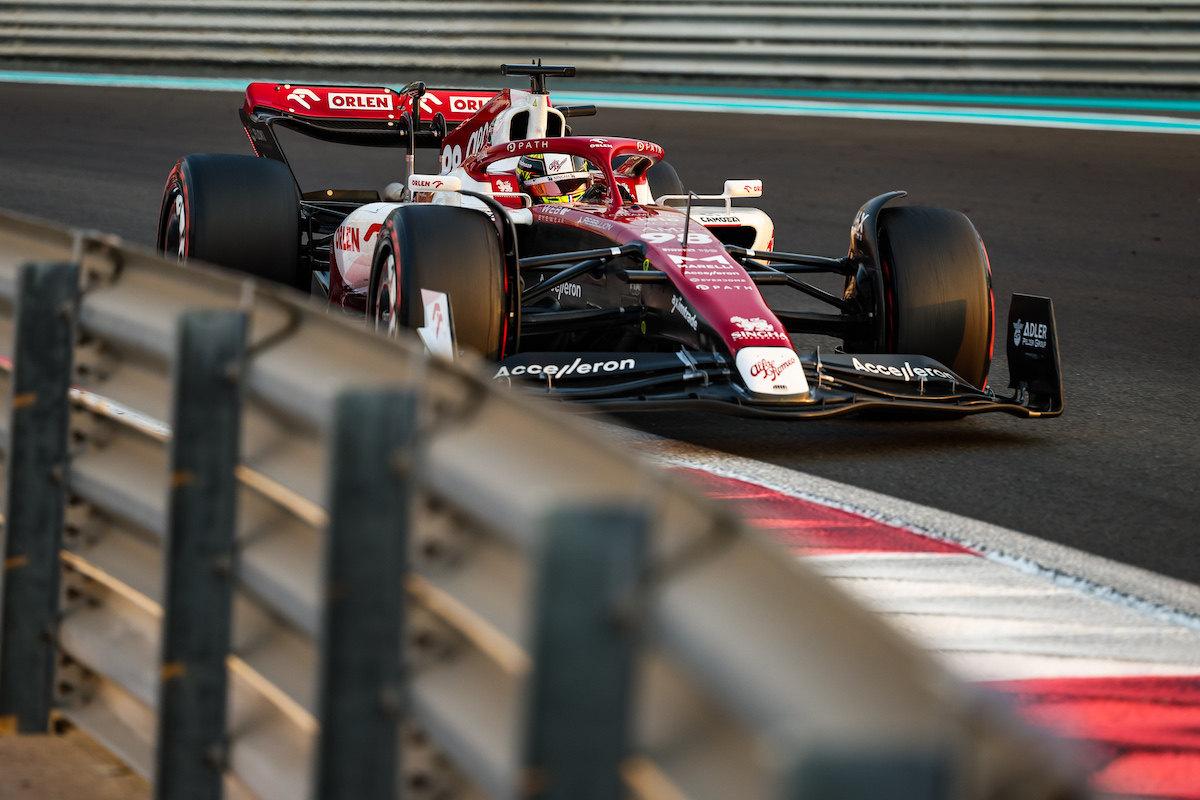
Photo: Alfa Romeo F1 Team
He’s on the brink of becoming F2 champion, but Theo Pourchaire’s hopes of an F1 drive for 2024 seem over. After three years in F2, how much does he deserve that chance, and how can he now make it happen?
Should Theo Pourchaire become Formula 2 champion 10 weeks from now – and he should, with a 25-point lead and only 39 left to play for – he will do so knowing that he will probably spend next year on Formula 1’s sidelines again as reserve driver for Sauber.
The team announced on Thursday that it will retain Zhou Guanyu alongside Valtteri Bottas for a third year in 2024, and that Pourchaire will continue as its reserve driver. That seemingly ends any remote chance that the Frenchman might have found his way onto next year’s grid with another team – although stranger things have happened with young drivers who have found themselves in such positions.
This is naturally a cause for disappointment, not only for Pourchaire – even if he probably won’t admit it just yet – but also for those who have followed his career progress and believe he deserves his chance.
Expecting perfection from young drivers in modern F2 is unrealistic, such are the myriad and often random factors at play, and it’s unnecessary too. One only needs to look at how effectively Liam Lawson has handled his adaptation to F1 in recent weeks to understand that difficulties living up to expectation in F2 does not mean that a talented driver cannot make a strong impression at the highest level.
Even after three years in F2, Pourchaire does not appear to be a finished article. But he has played the game very well to put himself on the brink of winning the title. And perhaps most importantly, he evidently still excites people. Young drivers who excite, like Lawson or Pourchaire, are exactly the kind that we want to see getting their chance in F1. They might not be perfect, and maybe they won’t succeed in the end, but they could also have that special something that it takes.

Photo: Formula Motorsport Ltd
In his rapid rise to F2, Pourchaire showed plenty of impressive speed, even if his approach to F2 has appeared somewhat different in a series where consistency is key but hard to achieve. He’s only taken three pole positions in three years and he hasn’t won a race since this year’s opening round in Bahrain, but he’s been on the feature race podium seven times out of 12 this season. Considering he only turned 20 last month, the ability to take that approach and make a success of it is impressive in itself.
He has shown improvement with every year in and out of the car, making a step up in wheel-to-wheel combat this term while also cutting down on mistakes – even if a win did go missing from a high-profile error at Zandvoort. He’s also reacted well to setbacks, like bouncing back to take pole at Monza just five days after his Dutch disappointment.
Zhou has done a solid job alongside Bottas, and his like-for-like record over his three years of F2 is much closer to Pourchaire’s in terms of points than you might expect – although the format and points distribution has changed in that time.
Zhou and Pourchaire’s F2 records compared
| Zhou Guanyu | Theo Pourchaire | ||||||||||
|---|---|---|---|---|---|---|---|---|---|---|---|
| Year | Wins | Poles | Podiums | Points | Pos | Year | Wins | Poles | Podiums | Points | Pos |
| 2019 | 0 | 1 | 5 | 140 | 7th | 2021 | 2 | 1 | 3 | 140 | 5th |
| 2020 | 1 | 1 | 6 | 151.5 | 6th | 2022 | 3 | 0 | 7 | 164 | 2nd |
| 2021 | 4 | 1 | 9 | 183 | 3rd | 2023* | 1 | 2 | 10 | 191 | 1st |
Of course, in comparing their records, we must remember that Pourchaire has not benefitted from the same level of preparation and old-car testing that Zhou had, nor had the support of one of the big F1 academies with dedicated staff and proven methods. But you can understand why Sauber has kept faith with Zhou and doesn’t see Pourchaire as a significantly better alternative, particularly considering his relative lack of experience. Not forgetting that it has access to internal data about the two drivers that the outside world cannot see.
It is perhaps a little frustrating that Pourchaire will have to stay in his role at Sauber now and not at least have a chance to explore possibilities with other F1 teams, even if it’s just as reserve with a bigger squad. But if Sauber paid towards his third year in F2, as Pourchaire has told Formula Scout was the case, it is understandable that a contractual option on the team’s side for 2024 would have been included to protect that investment – as is standard when F1 teams support young drivers.
Maybe a bigger frustration – or question mark at least – is whether Pourchaire could have benefitted from some better advice and guidance during his career. Has the relationship with Sauber been useful overall compared to other opportunities that might have existed with other teams? Testing chances in older F1 machinery have been limited compared to what Zhou or Oscar Piastri received from Alpine, for example. And has a third year in F2 with the same team really been beneficial, even if he wins the title, if there is no F1 seat at the end of it?
There is perhaps a similarity there with the previous F2 champion, Felipe Drugovich, who was also said to be a contender for the Sauber drive as he too looks to find a way onto the grid. Both have been locked into reserve roles at teams where there are no vacancies for a race drive, even though they might offer better options for another team elsewhere, such as Williams.

Photo: Alfa Romeo F1 Team
So where does Pourchaire go from here? How can he change the situation at Sauber to stand a chance of promotion to a race drive in 12 months’ time, or attract interest from another team?
Sealing the deal and winning the F2 title is surely a must, but having his short-term future secured – even if it’s not what he ideally might have wanted – should help him to approach that in a relatively relaxed manner as opposed to if a 2024 seat would be on the line. There will be less pressure too on the free practice appearances he’s expected to make before the end of the year.
Doing a Drugovich and focusing solely on his reserve driver role next year likely won’t help much, especially as he probably can’t bring money to the table to try force his way over the line. He might flourish working outside of the high-pressured F2 environment – rather like Zhou has done – but opportunities to impress as a reserve are limited along with seat time.
His best chance will be to race somewhere else in 2024 like Super Formula, just as Lawson has done this year. After four years with ART Grand Prix, moving to a different environment would help further his development and give him a chance to show F1 what it’s missing.